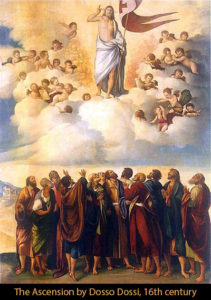“From the fig tree learn its lesson: as soon as its branch becomes tender and puts out its leaves, you know that summer is near. So also, when you see these things taking place, you know that he is near, at the very gates. Truly, I say to you, this generation will not pass away until all these things take place. Heaven and earth will pass away, but my words will not pass away.
“But concerning that day or that hour, no one knows, not even the angels in heaven, nor the Son, but only the Father. Be on guard, keep awake. For you do not know when the time will come. It is like a man going on a journey, when he leaves home and puts his servants in charge, each with his work, and commands the doorkeeper to stay awake. Therefore stay awake–for you do not know when the master of the house will come, in the evening, or at midnight, or when the rooster crows, or in the morning– lest he come suddenly and find you asleep. And what I say to you I say to all: Stay awake.” –Mark 13:28-37
If we take this passage by itself, the likelihood of getting it wrong is quite high. These words of Jesus are part of an eye-opening answer to a specific question about when the Temple in Jerusalem will be destroyed, with not one stone left upon another. That means, contrary to many popular interpretations, this is not (at least for the original audience) about the end of the world. Even the famous line, “But concerning that day or that hour, no one knows, not even the angels in heaven, nor the Son, but only the Father,” is not primarily about the Second Coming of Christ, but about the day or hour of the siege of Jerusalem and the desecration and destruction of the Temple.
Jesus recently used the fig tree as an illustration of fruitless Israel, who had no fruit with which to bless the world as God had intended. It would be destroyed. Now Jesus uses a fig tree again to illustrate that when it “puts out its leaves, you know that summer is near.” Just like that, when you see the things Jesus has been describing take place, then you’ll know that “it” (better than the overly-interpreted “he” of some translations) is near. Here’s how near it is: “This generation will not pass away until all these things take place.” The generation who is hearing the answer is the generation who will see it.
What does it mean, then, that “Heaven and earth will pass away, but my words will not pass away”? Jesus is the last in the long succession of God’s prophets. If you remember His second riddle in the Temple complex (the Parable of the Wicked Tenants), the son who is sent to the vineyard is the last possible representative that the father can send; there can be no one after him. Jesus is the last one to be sent, so “this generation” that rejects the message of the Son will be the generation upon whom the end will fall. Therefore, “Heaven and earth will pass away, but my words will not pass away” is Jesus’ most solemn assurance that even though all the world for them will be wrecked, His words will stand.
Jesus says He does not know exactly the day or hour that this will take place like the Father does in heaven. That said, Jesus could have gone two different ways: “Sit and work out an elaborate time table for when this will occur,” or, “Be on guard, keep awake. For you do not know when the time will come.” To which of these do we tend to lean? Convicting, isn’t it? And then He provides another short illustration about a man who goes on a journey, leaves his servants in charge, “and commands the doorkeeper to stay awake.”
The early church’s temptations to assimilate into the resulting Jewish culture (all-law-no-Temple) or pagan world must have been powerful. We read in the Apostle Paul’s letters of a brooding, imminent crisis requiring his readers, too, to keep awake and not assimilate. Sometimes they do, and sometimes they don’t. Assimilation never works for them, though, always leading to division and suffering.
Now, with it thoroughly understood that this passage applies to the original audience (“this generation”), we can see how it is typological, in a sense, of our own world and experience. There is going to be a coming in the clouds of the Son of Man again. This will be in a different direction (to earth!) than His previous “coming” to God’s throne. We do not know the day or the hour. The Son of Man has gone on a journey, left “home,” and put us in charge of His great, earthly estate. Will we keep awake? Will the door be left unguarded? Will we hoard up all the blessings for ourselves? Will we assimilate into the world? Because when He comes again, He is going to restore the estate worldwide where there is no enemy left at the gate, and He promises eternal life to all those inside. And that’s the gospel.
